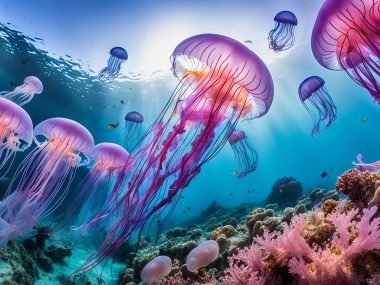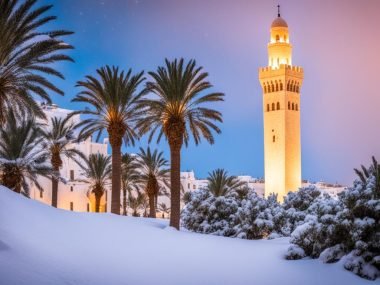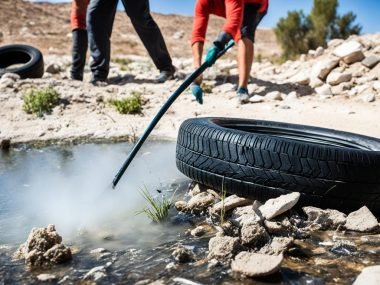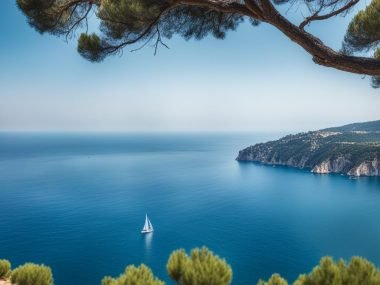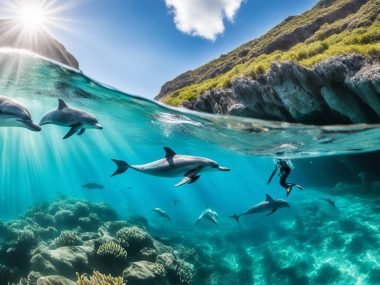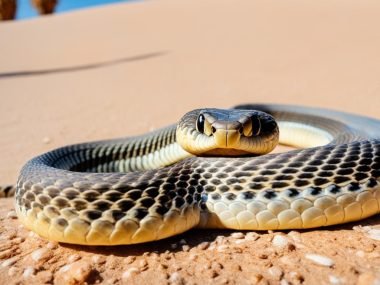Did you know Tunisia is North Africa’s smallest nation? It’s important in culture and history. Known as the Republic of Tunisia, it sits at Africa’s top. It’s next to Algeria and Libya. The sea at its north and east connects it to Italy and Malta. This makes Tunisia key in history and trading.
The capital is Tunis. It’s where the country’s heart beats strongest. It’s filled with history from old times. Its links to places like Sicily and Sardinia show its importance. This matters even today.
Key Takeaways
- Tunisia is the smallest country in North Africa.
- The capital, Tunis, is the centre of political and cultural activities.
- Shares borders with Algeria and Libya.
- Maritime connections to Italy and Malta.
- Rich historical background with ancient civilisations.
Introduction to Tunisia
Come with us to see Tunisia’s geography and history. It’s a special mix of culture, history, and nature. Located in North Africa, Tunisia blends its past and present beautifully.
Geographical Location
Tunisia is in North Africa’s Maghreb area, sitting at 34°N 9°E. The capital, Tunis, is lively and central. It has different landscapes, from mountains to the Sahara Desert.
Historical Background
Tunisia’s story starts around the 9th century BC. The city of Carthage shows its ancient roots. Places like the Great Mosque of Kairouan tell of its Islamic history. Its ruins and buildings show a long journey of creativity and cultural growth.
Official Identity and Sovereignty
The Republic of Tunisia is known for its unique symbols. These symbols show the pride and unity of its people. They reflect Arab identity and Islamic faith.
National Symbols
In Tunisia, the flag and coat of arms are important symbols. The flag has a red field with a white disc. This disc has a red crescent and a five-pointed star. The coat of arms shows the country’s history and culture. It represents protection and justice. The anthem, Humat al-Hima, is about freedom and dignity. These themes are key to Tunisian citizenship.
Government and Constitution
Tunisia is a unitary semi-presidential republic. It combines presidential authority with parliamentary oversight. The country is run by a president, a prime minister, and a bicameral parliament. The 2022 constitutional reforms have strengthened democracy. They show Tunisia’s commitment to sovereignty and good governance.
| Aspect | Details |
|---|---|
| Flag | Red field with a white disc, red crescent, and star |
| Coat of Arms | Symbolises justice, strength, and protection |
| National Anthem | Humat al-Hima |
| Official Language | Arabic |
| Government Type | Semi-presidential republic |
| Constitutional Reform | Updated in 2022 to fortify democratic principles |
Tunisia’s Position in North Africa
Tunisia is at the very top of Africa. It plays a big part in the area around it. African country Tunisia is next to Algeria and Libya. This makes its place very important in North Africa. This spot influences a lot in Tunisia, like its economy and politics.
Neighbouring Countries
Tunisia’s borders with Algeria and Libya are very important. They help Tunisia connect with other countries around it. These links lead to working together in trade, safety, and sharing culture. Being close to the Mediterranean Sea also helps Tunisia trade and talk with countries in Europe.

Regional Relations
Tunisia is an important African country. How it deals with neighbours shapes its role in Africa. It works and sometimes competes with countries near the Mediterranean Sea, like Italy. This affects many things in Tunisia, like business, culture, and who it is friends with.
Let’s look closer at Tunisia’s neighbours:
| Country | Relation Type | Key Interactions |
|---|---|---|
| Algeria | Bilateral Cooperation | Trade agreements, border security, cultural exchanges |
| Libya | Economic Partnership | Trade relationships, energy contracts, refugee support |
| Italy | Maritime Relations | Trade, migration policies, cultural dialogue |
Historical Rulers and Foreign Influence
Tunisia has a long history full of foreign influence. Foreign influence has really shaped its culture and society. This history includes Phoenician settlers and Carthaginian and Roman rule.
Phoenician and Carthaginian Influence
The Phoenicians came to Tunisia around the 9th century BC. They founded the city of Carthage. Carthage then became a huge trade power in the Mediterranean.
Roman and Arab Conquests
After the Punic Wars, the Romans took over Tunisia. The Roman influence lasted a long time. It brought new building styles and spread Christianity. People started mixing Roman customs with their own.
The Arabs came in the 7th century. They brought Islam and the Arabic language. This changed Tunisia’s culture and religion, creating a mainly Arab-Berber society. Each period has influenced what Tunisia is today.
| Historical Period | Key Influences | Lasting Impact |
|---|---|---|
| Phoenician and Carthaginian | Trade, Military | Cultural Foundations |
| Roman Conquest | Governance, Architecture | Christianity, Infrastructure |
| Arab Invasion | Islam, Arabic Language | Religious and Cultural Identity |
Many rulers and foreign influences have shaped Tunisia over centuries. Every era has left its mark on Tunisia’s national identity. This has created the modern idea of Tunisian citizenship.
Modern-Day Governance of Tunisia
Since 1956, Tunisia has changed a lot in how it is governed. Now, it has a system where both the President and Prime Minister have roles. This mix has seen both steady times and challenges. The 2011 revolution is a big example.
Political Structure
In Tunisia, power is shared between the President and the Prime Minister. This helps keep things balanced. The President deals with foreign policy and security. The Prime Minister handles everyday government tasks and domestic policy.
International Alliances
Tunisia is active in the world through its memberships with big groups. It’s part of the United Nations, African Union, and Arab League. It also has strong ties with France, Italy, and the USA. These connections help Tunisia play a key role in peace, economy, and politics globally.
| Alliance | Description |
|---|---|
| United Nations | Tunisia contributes actively to UN peacekeeping missions and enjoys membership in various UN committees and councils. |
| African Union | Membership allows Tunisia to engage in continental initiatives and collaborate on economic, social, and political affairs. |
| Arab League | Through the Arab League, Tunisia cooperates with Arab countries on a plethora of regional issues, including conflict resolution and economic development. |
| France | The historical and cultural ties with France are reflected in strong economic relations and cooperative political undertakings. |
| Italy | Tunisia’s proximity to Italy fosters a partnership focused on trade, migration issues, and cultural exchange. |
| United States | As a major non-NATO ally, Tunisia benefits from military cooperation, economic aid, and diplomatic support from the US. |
What Country Does Tunisia Belong To?
Tunisia became independent in 1956. Since then, it stands as its own country. It doesn’t belong to any other country.
If you’re wondering what country does Tunisia belong to, know it’s independent. Its history and government actions today show this. Tunisia makes its own rules in politics, economy, and culture.
Tunisian Citizenship
Understanding Tunisian citizenship is about seeing both the rights and the rules that come with it. It’s about knowing what you can do and what you must do as a citizen. This balance helps the Tunisian nation to grow strong and stay united.
Eligibility and Rights
Being a Tunisian citizen often means you were born to Tunisian parents. This is called jus sanguinis. But, people can also become citizens through other legal ways if they meet certain requirements.
Citizens of Tunisia have many rights. These rights let them take part in votes, speak their mind, and use social services. All these are protected by the country’s constitution.
Duties and Responsibilities
With rights come big duties in Tunisia. Following the country’s laws is important for everyone. Men might have to serve in the military, which helps keep the country safe.
Citizens should also get involved in their communities and help out. Doing this helps Tunisia become a better place for everyone.
In the end, having rights and doing your part as a citizen is what makes Tunisia strong. This balance is key to a happy and thriving society.
Economic and Cultural Integration
Tunisia is like a rich tapestry. It mixes economy and culture beautifully. We see a country that uses its resources well and loves its culture.
Agriculture and Industry
Tunisia’s economy is strong thanks to farming and industry. Farming is key, giving us olives, dates, grains, and more. Since becoming independent, Tunisia has grown in industry. Now it has textiles, oil, mining, and tourism.
Language and Education
Language and learning are vital in Tunisia. Modern Standard Arabic is the main language. French is used in schools and for work, helping Tunisia connect with the world.
Education is a treasure, old and new. The Great Mosque of Kairouan shows old learning ways. Today’s schools and universities make sure young Tunisians are ready for tomorrow’s world.
| Sector | Role | Impact |
|---|---|---|
| Agriculture | Historic Staple | Supports rural economy, provides export goods |
| Industry | Modern Expansion | Diversifies economy, creates employment |
| Language | Cultural Pillar | Enhances communication, preserves heritage |
| Education | Growth Enabler | Promotes intellectual and economic development |
Geopolitical Importance of Tunisia
Tunisia is at the top of Africa. It is very important because of where it is. It connects Africa and Europe, making it key for peace and dealing with other countries.

Strategic Location
Tunisia has beaches on the Mediterranean Sea. It links Africa and Europe. It is essential for trade and the military, making it important worldwide.
Regional Stability
Tunisia helps keep peace in North Africa. Its politics and talks help solve fights. This helps keep the Mediterranean area safe and wealthy.
This shows why Tunisia is so key. It plays a big part in how countries get along.
Conclusion
Tunisia is a country rich in history and it stands alone. What country does Tunisia belong to? It belongs only to itself. This shows Tunisia’s strong spirit and independence.
Exploring Tunisia shows its key role in North Africa and the world. It sits where many cultures meet, making it unique. From Carthage to Tunis, it remains independent, highlighting its lasting impact.
Tunisian identity is a mix of many cultures, all moving forward together. This blend of old and new gives Tunisia its special vibe. It stands proudly, balancing tradition and progress, making a mark worldwide.


